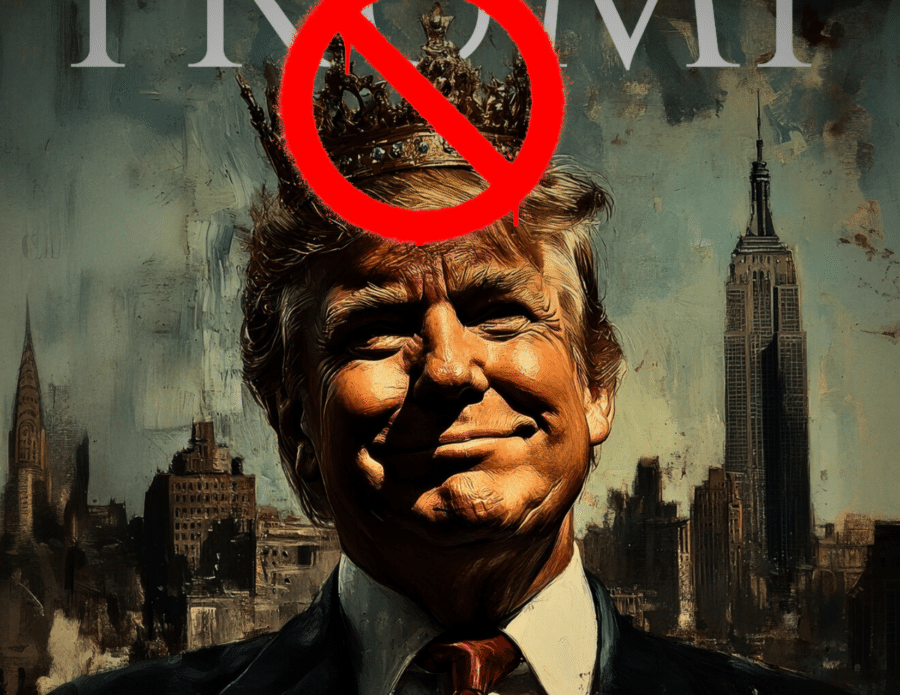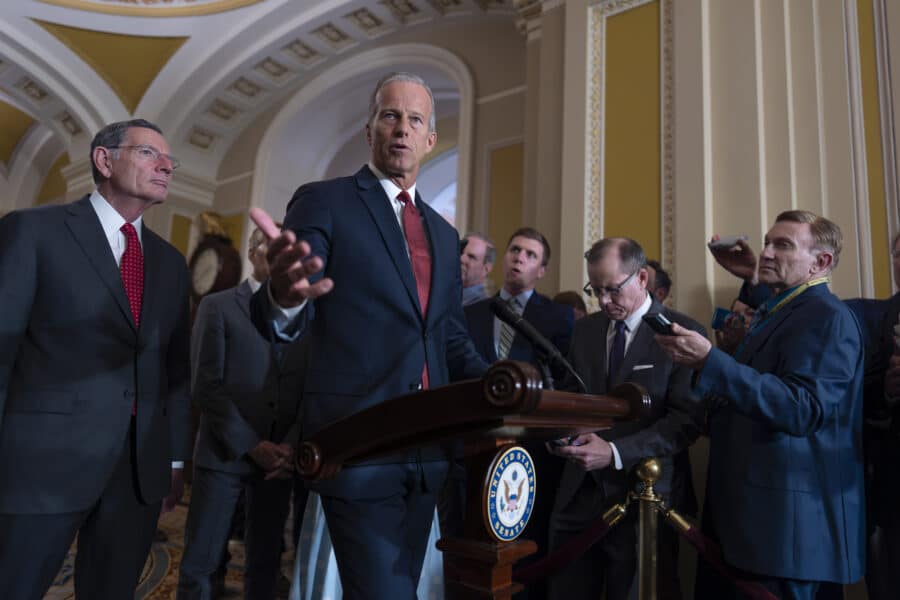This is the third installment of Barn Raiser’s 2024 election coverage series “Charting a Path of Rural Progress,” which features interviews with rural policy experts and organizers who came together in Omaha, Nebraska, in 2023 to forge a rural policy platform on which candidates can run—and to which voters can hold their elected leaders accountable. The platform that grew out of that Omaha meeting, A Roadmap for Rural Progress: 2023 Rural Policy Action Report, released last October, details 27 legislative priorities for rural and small town America, based on legislation that has already been introduced in Congress.
Igniting Democracy in Georgia, One Rural County at a Time
Eradicating civic deserts ‘step by step’


Brandon Byrd grew up in Metter, Georgia, population 4,004 (2020), in rural deep-red Candler County, about 65 miles west of Savannah (in 2016 and 2020, more than 70% of voters in Candler County chose Trump). He graduated from Georgia State University in Atlanta with a B.S. in Public Policy Analysis. After stints working for Planned Parenthood and the Atlanta mayor’s office, in December 2021 Byrd was hired by the New Georgia Project Action Fund as the Lead Organizer for Georgia Ignite, a rural-focused group that “aims to activate a network of grassroots, self-starting organizers and activists in communities across Georgia.”
In his short essay “Tools to Enact Change,” in A Roadmap for Rural Progress: 2023 Rural Policy Action Report, Byrd describes the key to building rural movements as the ability to “[give] folks the tools to enact change… specific to their local communities.” The problem, Byrd writes, is that these tools have historically been displaced from rural communities. “Urban areas are the constant targets of civic engagement and investment,” Byrd writes, “because it is perceived that these are the only places capable of progressive change.” As an organizer, Byrd tells Barn Raiser, his work is about seeking to “disrupt and disprove” this narrative.
Metter, where you grew up, is the main town in a county of 10,981 that is 60% white, 24% Black and 13% Latino. What was it like growing up there? Was there a racial divide?
It’s not a spoken divide because Candler County is so small. Everybody knows everybody. These are the people who you went to school with and have been around all your life.
It’s that unspoken divide where it’s like, “I know how I feel about stuff, but I also know how you feel about those same things. But because we have to interact and work together, it is unspoken.” But oftentimes there are events that will shake things up, that’ll bring out those feelings. And then, for a time, there’ll be a divide.
My first time witnessing a movement for racial justice was when I was in eighth grade and Trayvon Martin was killed by George Zimmerman. Up until that point, we had issues here and there, regular teenage drama, but pretty much people got along. I like to call it the hidden, nice racism because, “Oh, we all get along. I don’t see color.” But when the murder of Trayvon Martin happened, that’s when we really saw, “Okay, this is how we feel and this is how y’all feel.” Things got really tense in our schools. So there’s those tensions, and then over time it’ll come back together.
People get along for survival in these rural areas because they don’t want to disrupt anything. They don’t want to mess anything up saying wrong things or making the wrong folks mad.
Jim Crow is gone but its legacy remains in policies that still make it difficult for people to register and vote. What challenges do rural voters in Georgia face?
One of the biggest pieces of legislation currently proposed in Congress is the Vote at Home Act, which ensures that everyone will be to be able to vote from home. We had a bill that passed in the Georgia legislature, SB 202, after Georgia turned blue for Joe Biden that made it harder to vote, especially to vote by mail. [SB 202 restricted early voting and ballot drop boxes and criminalized providing water and food to voters waiting in line to vote.]
Some rural counties in Georgia only have one polling precinct in the entire county. And people with disabilities aren’t able to go directly to those polls.
Like the Vote at Home Act, the Freedom to Vote Act, another bill proposed in Congress, seeks to expand access to the ballot box, but it also decreases the influence of big money in politics.
Having been a fundraiser on campaigns before, people focus on the big dollar donors, and those are the people who get one-on-one interactions and get to voice their opinions to the candidates. Meanwhile, people in rural areas—where our economies aren’t as big and people don’t have as much discretionary money to give—those people don’t get face time at all. The candidates don’t go to hear their concerns. They don’t get to ask questions. They rely on television and radio ads to convince them to vote for a certain person or to just vote in general, because the money isn’t there. But that’s not their fault. Rural areas have been undeveloped for so long. The Freedom to Vote Act helps get that big money out of politics.

At New Georgia Project Action Fund, how are you organizing during this election year? What’s your strategy?
The biggest piece is about voter education and direct contact with people to tell them face-to-face, “This is what’s going on. And that we want you to join us.”
The project that I’m working on is called Georgia Ignite. I’m focused on going into these rural areas, these pockets of civic deserts, and trying to eradicate these civic deserts step by step. That means going to places where those communities gather, setting up a table and having conversations with folks.
What are civic deserts?
Civic deserts are places where people, candidates and nonprofit organizations aren’t civically engaged. That includes candidates not going to visit specific rural areas or communities and giving those people face-to-face interaction or nonprofits not going to those communities to hold voter education actions or get-out-the-vote drives. I compare those things to being like the water, and the people are like the ground. And if you don’t put in the water, there’s a desert. The waters of civic engagement aren’t there. It takes that deep relational organizing to eliminate that.
One of the big things with rural people is that you have to relate. I’m proud of where I’m from. It set the foundation for where I’m at in my thinking and how I go about my work in face-to-face conversations, especially with rural folks.
So—me being from a rural area and being able to go into those rural communities—they see me as a safe person to talk to because of my rural experiences. We can relate.
From there, we can hold training sessions and educate people about civics and the way actual government works, and then we can train local rural people to be more civically engaged. So when we go to vote, or hold elected officials accountable, we know who we’re going to vote for and we how to hold those people accountable.
Why do you think rural areas are so ignored?
It got in people’s heads that rural was synonymous with white and that white is synonymous with conservative, which has led Democrats to divest funds from rural areas and focus mainly on the urban areas. But that’s not the case at all.
In Georgia, we have this strip that goes along the middle of the state that we call the Georgia Black Belt because of the heavily Black populations that are concentrated within that belt.
These smaller areas that you neglect can determine how elections go. That’s what happened in 2020 when Georgia went for a Democratic presidential candidate for the first time in nearly 20 years.
You have these civic deserts full of progressive people who aren’t being heard. So somebody needs to get in touch with these people and mobilize them, adding to those progressive margins and fighting for the issues that we really care about.

You were one of the more than 50 strategists, researchers, organizers and elected officials who attended the Rural Policy Action Summit in Omaha in April 2023 and helped draft the Rural Policy Action Plan. What was that experience like?
One of the major things that I took away from that experience was that, even though we’re all focused on economic rural development, democracy and infrastructure, “rural” looks different across the United States. We had people who were there from Alaska—I had never met people from Alaska before—and some of those northern states bordering Canada. And what rural looks like to them is totally different from rural Georgia.
So it was fun. Hearing about their experiences—you know they are farmers, they raise livestock and they were doing different things in their communities that were great. But one thing I noticed was that I was the only Black male in the space. It made me realize that there are more people out there like me who have interest in this kind of this kind of work, but oftentimes we don’t know how to get access to it.
My family wasn’t super politically involved—we didn’t know this person from that person, and we didn’t have organizations like New Georgia Project Action Fund around. So getting entry into work like this is hard. Even during my first year at New Georgia Project Action Fund, I didn’t know that the Rural Democracy Initiative existed. [The Rural Democracy Initiative, which convened the Omaha Summit supports the work of 150 rural-focused nonprofits in more than 20 states, including Barn Raiser.]
So, it was rewarding to take my experience in Omaha and let people at home know that there are coalitions of people out there who are also rural, who want to see progress in their communities, and that our voices are needed in spaces like this.
Recent polls have shown that Trump is making inroads in Black and brown communities, shaving off percentages of those voting blocs that could give him winning margins in swing states. What do you make of that?
That’s a messaging issue. Black people like Trump because he gave people money [through Economic Impact Payments, or stimulus checks] and he let people out of jail [when he signed the First Step Act that Congress passed]. Last fall, a popular rap artist, who goes by the name of Sexxy Red, said on the podcast “This Past Weekend”:
“I like Trump. Yeah, they support him in the hood. At first I don’t think people was f–king with him. They thought he was racist, saying little s–t against women. But once he started getting Black people out of jail and giving people that free money. Aww baby, we love Trump. We need him back in office. We need him back because, baby, them checks. Them stimulus checks. Trump, we miss you.”
That comes back to the education piece I was talking about. Trump’s supporters marketed that messaging, and because many of our communities aren’t really civically engaged, people don’t understand that it was an act of Congress and not the president who was responsible for that check with his name on it, and there was no big push to clarify that.
While we do have policies out there to help Black and brown communities, it’s never anything tangible that you could feel per se. For people who’ve been systematically oppressed for so long and had promises made and promises broken, a stimulus check was something that people could build on. Letting incarcerated people out of jail was something that people felt because it was within their purview. It boils down to that messaging and letting people know what the actual facts were and not just letting bullshit fly.
Joel Bleifuss is Barn Raiser Editor & Publisher and Board President of Barn Raising Media Inc. He is a descendent of German and Scottish farmers who immigrated to Wisconsin and South Dakota in the 19th Century. Bleifuss was born and raised in Fulton, Mo., a town on the edge of the Ozarks. He graduated from the University of Missouri in 1978 and got his start in journalism in 1983 at his hometown daily, the Fulton Sun. Bleifuss joined the staff of In These Times magazine in October 1986, stepping down as Editor & Publisher in April 2022, to join his fellow barn raisers in getting Barn Raiser off the ground.
Justin Perkins is Barn Raiser Deputy Editor & Publisher and Board Clerk of Barn Raising Media Inc. He received his Master of Divinity degree from the University of Chicago Divinity School. The son of a hog farmer, he grew up in Papillion, Neb., and got his start as a writer with his hometown newspaper the Papillion Times, The Daily Nebraskan, Rural America In These Times and In These Times. He has previous editorial experience at Prairie Schooner and Image.
Have thoughts or reactions to this or any other piece that you’d like to share? Send us a note with the Letter to the Editor form.
Want to republish this story? Check out our guide.
More from Barn Raiser

This Year, Flag Day Is ‘No Kings Day’









